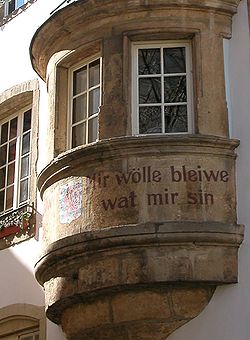
Mir wëlle bleiwe wat mir sinn
Encyclopedia

Luxembourgish language
Luxembourgish is a High German language spoken mainly in Luxembourg. About 320,000 people worldwide speak Luxembourgish.-Language family:...
for "We want to remain what we are") is the national motto of Luxembourg
Luxembourg
Luxembourg , officially the Grand Duchy of Luxembourg , is a landlocked country in western Europe, bordered by Belgium, France, and Germany. It has two principal regions: the Oesling in the North as part of the Ardennes massif, and the Gutland in the south...
. It refers to the ambition of the Luxembourgish people to remain separate from, and independent
Independence
Independence is a condition of a nation, country, or state in which its residents and population, or some portion thereof, exercise self-government, and usually sovereignty, over its territory....
of, those neighbouring countries around it that have traditionally dominated it politically and militarily: Belgium
Belgium
Belgium , officially the Kingdom of Belgium, is a federal state in Western Europe. It is a founding member of the European Union and hosts the EU's headquarters, and those of several other major international organisations such as NATO.Belgium is also a member of, or affiliated to, many...
, France
France
The French Republic , The French Republic , The French Republic , (commonly known as France , is a unitary semi-presidential republic in Western Europe with several overseas territories and islands located on other continents and in the Indian, Pacific, and Atlantic oceans. Metropolitan France...
, and Germany
Germany
Germany , officially the Federal Republic of Germany , is a federal parliamentary republic in Europe. The country consists of 16 states while the capital and largest city is Berlin. Germany covers an area of 357,021 km2 and has a largely temperate seasonal climate...
.
Origin
The phrase's origin can be traced back to De Feierwon, the Luxembourg national hymn of 1859; originally written to pay hommage to the first international (cross-border) railroad in the country, the hymn's chorus read:
Kommt hier âus Frankräich, Belgie, Preisen,
Mir wëlle Iech ons Hemécht weisen.
Frot Dir no all Seiten hin,
We mir eso zefriede sin."Come ye from France, Belgium, Prussia/We want to show you our homeland/You can ask all around/how content we are here."
In 1871, an anonymous poet, only known as M Tout-le-monde, changed the last two lines of this chorus to read
Mir welle jo keng Preise gin,
Mir welle bleiwe wat mir sin!"Look, we don't want to become Prussian/we want to remain what we are!"
Due to its political incorrectness at the time, the duke forbade public singing of the hymn; nonetheless, the famous line survived.

